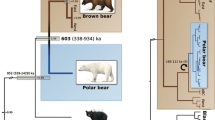Abstract
Biological individuality was a hotly debated concept in nineteenth-century German biology, both in botany and in zoology. Much discussion centered on a comparison of higher plants with colonial organisms that are subject to polymorphism and exhibit division of labor among their parts. Building on the work of Matthias Jakob Schleiden, Johannes Müller, Rudolf Leuckart, and especially the botanist Alexander Braun, Haeckel in his writings continued to refine his theory of relative individuality. Haeckel recognized three kinds of individuality: physiological, morphological, and genealogical, the latter two hierarchically structured. These distinctions allowed him to embed in his theory of relative (biological) individuality the threefold parallelism of ontogeny, phylogeny, and classification. For Haeckel, this threefold parallelism provided the strongest proof for Darwin’s theory of descent with modification.

Similar content being viewed by others
References
Agassiz L (1857 [1859]) An essay on classification. Longman, Brown, Green, Longmans & Roberts, London
Bölsche W (1900 [1906]) Ernst Haeckel. His life and work. English translation by McCabe J, 1906. George W. Jacobs, & Co., Philadelphia
Braun A (1851 [1853]) Betrachtung über die Erscheinung der Verjüngung in der Natur, insbesondere in der Lebens—und Bildungsgeschichte der Pflanze; translation by Henfrey A, 1853. Ray Soc Bot Physiol Mem 1853: 1–341
Braun A (1853) Das Individuum der Pflanze in seinem Verhältnis zur Species. Generationenfolge, Generationswechsel und Generationstheilung der Pflanze. Abh Königl Akad Wiss Berlin 1854:19–122
Haeckel E (1862) Die Radiolarien. (Rhizopoda Radiaria). Eine Monographie. Georg Reimer, Berlin
Haeckel E (1864) Über die Entwickelungstheorie Darwins. Ber Versamml Deutsch Naturf Ärzte 38:17–30
Haeckel E (1866a) Generelle Morphologie der Organismen. Erster Band: Allgemeine Anatomie der Organismen. Georg Reimer, Berlin
Haeckel E (1866b) Generelle Morphologie der Organismen. Zweiter Band: Allgemeine Entwickelungsgeschichte der Organismen. Georg Reimer, Berlin
Haeckel E (1868) Natürliche Schöpfungsgeschichte, 1st edn. Georg Reimer, Berlin
Haeckel E (1872) Die Kalkschwämme. Eine Monographie. Georg Reimer, Berlin
Haeckel E (1874a) Die Gastraea-Theorie, die phylogenetische Classification des Thierreichs und die Homologie der Keimblätter. Jena Z Naturwiss NF 8:1–55
Haeckel E (1874b) Anthropogenie oder Entwickelungsgeschichte des Menschen. Wilhelm Engelmann, Leipzig
Haeckel E (1875) Ziele und Wege der heutigen Entwickelungsgeschichte. Jena Z Naturwiss 10((ns 3) Suppl):1–96
Hoßfeld U, Olsson L (2003) The road from Haeckel: the Jena tradition in evolutionary morphology and the origins of “evo-dvo”. Biol Philos 18:285–307
Huxley TH (1852) Upon animal individuality. Edinb New Philos J 53:172–177
Müller J (1843) Elements of physiology; translation by Bell J, 2nd edn. Lea and Blanchard, Philadelphia
Müller J (1858) Über die Thalassicollen, Polycystinen und Acanthometren des Mittelmeeres. Abh Königl Akad Wiss Berlin 1858:1–62
Nägeli CW (1856) Die Individualität in der Natur. Mit besonderer Berücksichtigung des Pflanzenreiches. Monatsschr wiss Ver Zürich 1:171–212
Nyhart LK, Lidgard S (2011) Individuals at the center of biology: Rudolf Leuckarts Polymorphismus der Indviduen and the ongoing narrative of parts and wholes. With an annotated translation. J Hist Biol 44:373–443
Nyhart LK, Lidgard S (2017a) Introduction: working together on individuality. In: Lidgard S, Nyhart LK (eds) Biological individuality. Integrating scientific, philosophical, and historical perspectives. University of Chicago Press, Chicago, pp 1–16
Nyhart LK, Lidgard S (2017b) Alternations of generations and individuality, 1851. In: Lidgard S, Nyhart LK (eds) Biological individuality. Integrating scientific, philosophical, and historical perspectives. University of Chicago Press, Chicago, pp 129–157
Olsson L, Levi GS, Hoßfeld U (2017) The “biogenetic law” in zoology: from Ernst Haeckel’s formulation to current approaches. Theory Biosci 136:19–29
Reynolds A (2008) Ernst Haeckel and the theory of the cell state: remarks on the history of a bio-political metaphor. Hist Sci 46:123–152
Richards RJ (2002) The romantic conception of life. Science and philosophy in the age of Goethe. The University of Chicago Press, Chicago
Richards RJ (2008) The tragic sense of life. Ernst Haeckel and the struggle over evolutionary thought. The University of Chicago Press, Chicago
Rieppel O (2010) Reydon on species, individuals and kinds: a reply. Cladistics 26:341–343
Rieppel O (2011) Ernst Haeckel (1834–1919) and the monophyly of life. J Zool Syst Evol Res 49:1–5
Rieppel O (2016) Phylogenetic systematics. Haeckel to Hennig. CRC Press, Boca Raton
Rieppel O (2017) Biological individuality and enkapsis: from Martin Heidenhain’s Synthesiology to the Völkisch National Community. In: Lidgard S, Nyhart LK (eds) Biological individuality. Integrating scientific, philosophical, and historical perspectives. University of Chicago Press, Chicago, pp 184–205
Rinard RG (1981) The problem of the organic individual: Ernst Haeckel and the development of the biogenetic law. J Hist Biol 14:249–275
Sachs J (1890 [1906]) History of botany (1530–1860); authorized translation by Garnsey HEF, revised by Balfour IB, second impression. Clarendon Press, Oxford
Schleiden MJ (1838) Beiträge zur Phytogenesis. Arch Anat Phys Wiss Med 1838:137–176
Schleiden MJ (1842) Grundzüge der wissenschaftlichen Botanik, nebst einer methodologischen Einleitung als Anleitung zum Studium der Pflanzen. Erster Theil: Methodologische Einleitung, Vegetabilische Stofflehre. Die Lehre von der Pflanzenzelle. Wilhelm Engelmann, Leipzig
Schleiden MJ (1843) Grundzüge der wissenschaftlichen Botanik, nebst einer methodologischen Einleitung als Anleitung zum Studium der Pflanzen. Zweiter Theil: Morphologie, Organologie. Wilhelm Engelmann, Leipzig
Spring AF (1838) Ueber die naturhistorischen Begriffe von Gattung, Art und Abart, und die Ursachen der Abartungen in den organischen Reichen. Eine Preisschrift. Friedrich Fleischer, Leipzig
Wilson RA (1996) Discussion: promiscuous realism. Brit J Philos Sci 47:303–316
Acknowledgements
I thank Georgy Levit, Uwe Hoβfeld, and Ulrich Kutschera for the invitation to contribute to this special issue commemorating Ernst Haeckel and for comments on an earlier draft of this manuscript.
Author information
Authors and Affiliations
Corresponding author
Additional information
Publisher's Note
Springer Nature remains neutral with regard to jurisdictional claims in published maps and institutional affiliations.
This article is a contribution to the Special Issue Ernst Haeckel (1834–1919): The German Darwin and his impact on modern biology—Guest Editors: U. Hossfeld, G. S. Levit and U. Kutschera.
Rights and permissions
About this article
Cite this article
Rieppel, O. The concept of the ‘organic individual’ in Haeckel’s writings. Theory Biosci. 138, 147–157 (2019). https://doi.org/10.1007/s12064-019-00287-1
Received:
Accepted:
Published:
Issue Date:
DOI: https://doi.org/10.1007/s12064-019-00287-1




